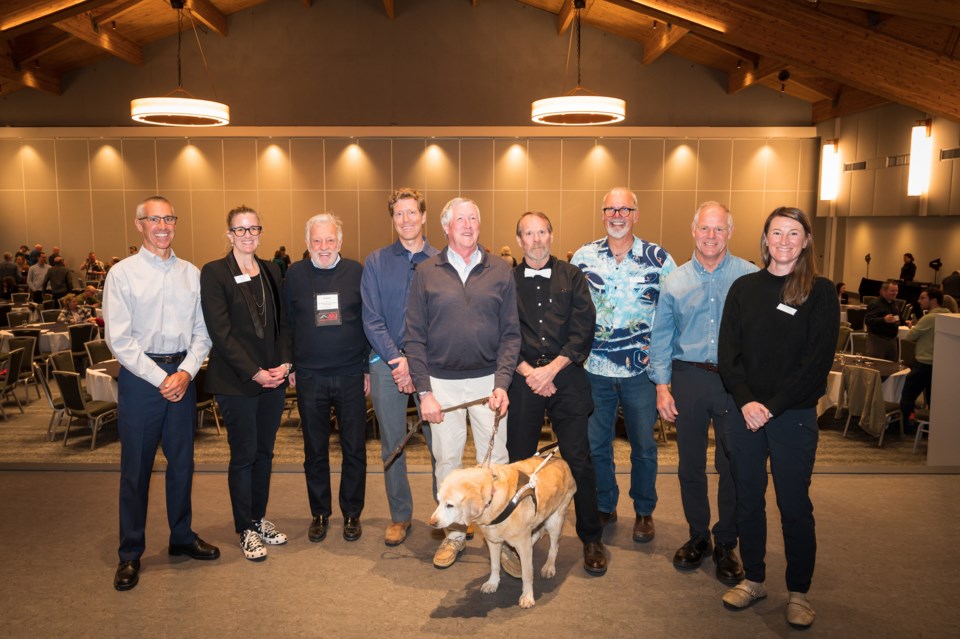There’s rarely a topic Whistler locals are more keen to talk about than housing: the issues, their causes, and, most of all, potential solutions.
Turns out, Whistler is far from the only ski town—or community in general—having those discussions. It’s one reason why the Whistler Institute partnered with the Canada West Ski Areas Association (CWSAA) to host a multi-panel discussion, called A Roof Over Our Heads: Exploring Mountain Resort Housing Possibilities, at the CWSAA’s Spring Conference, which took place in Whistler this year from April 25 to 27. It was the sixth event in the Whistler Institute’s Global Perspectives Speaker Series.
Organizers estimate about 200 people packed into the Whistler Conference Centre on Thursday afternoon, April 27, to listen intently as two separate panels dug into the topic, exploring strategies that have worked here in the valley and further afield. More than 60 per cent of the audience was made up of local attendees, while the remainder were CWSAA conference delegates, confirmed Suki Cheyne, executive director of the Whistler Institute.
“The Whistler Institute is very grateful to [CWSAA] for the opportunity to partner on this event, we were delighted to see so many delegates from resort communities across Western Canada and local community members attend the event and engage with the topic,” Cheyne wrote in an email.
The two-hour discussion was moderated by Pique columnist G.D. Maxwell. The first panel focused on Whistler’s approach to housing over the years, featuring panellists Steve Bayly, a founding director and the original general manager of the Whistler Housing Authority who has been active in B.C.’s real estate development and construction industry for more than four decades; Kate Roddick, senior project leader at Whistler Blackcomb; and Duane Jackson, former Resort Municipality of Whistler councillor and chair of the Whistler 2020 Development Corp.
The group discussed everything from how employers like Whistler Blackcomb are working to accommodate its shorter-term staff today, all the way back to some of Whistler’s earliest approaches to housing.
“Whistler was one of the first jurisdictions to allow suites,” as Bayly remembered. Officials limited those suites “to not more than two bedrooms and 800 square feet, and I think the zoning prescribed that they couldn’t be used for tourist accommodation,” he said, “and these suites were a great part of our workforce housing for many years. Lately a lot of them have been lost due to gentrification and other things, but they’re still a good source, and I think a source that should be encouraged.”
A second panel included Al Raine, mayor of Sun Peaks (who also happened to help develop Whistler) and George Ruther, director of housing for the Town of Vail, Colo. He was on hand to discuss that community’s Vail InDEED program, which incentivizes homeowners to deed-restrict existing properties so they can only be occupied by local employees. They joined Dale Mikkelsen, who was recently hired as head of the Resort Municipality of Whistler’s climate action, planning and development services division, but joined the panel to share insight from his previous longtime role as the director of development and chief operating officer for Simon Fraser University’s UniverCity, the sustainable community located adjacent to the academic institution atop Burnaby Mountain.
Following those discussions, both panels converged onstage to answer a wide array of questions posed virtually, through Slido. Panellists considered queries like “Why not build a 12-storey building for housing if land is limited?” and “Do we need to shift our focus from building more homes to utilizing existing availability? And could we entice homeowners to rent out suites?” before the event wrapped up, though they weren’t able to get to the long and growing list within the 30 minutes allocated.
“The panellists brought unique knowledge and experience to the discussions and they introduced some interesting concepts which, judging by the questions asked in the Q&A and the conversations afterwards, sparked ideas amongst those attending, which was our goal,” Cheyne explained. “Affordable housing is a huge topic with many avenues and we could hold this event several times over with different panels if time allowed. A single event won’t solve housing challenges in an afternoon, but it can start conversations and generate ideas that attendees can take back to their communities to explore in more detail.”
Stay tuned to Pique in the coming weeks for more on this event.




